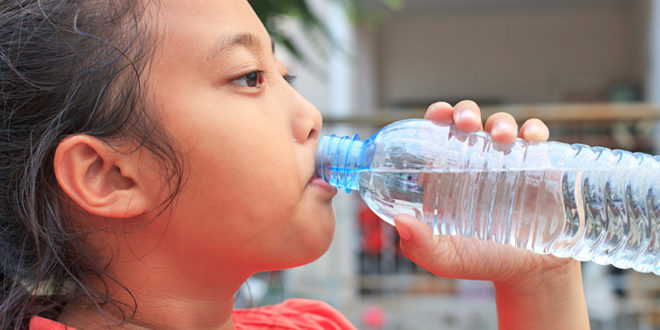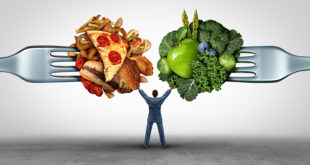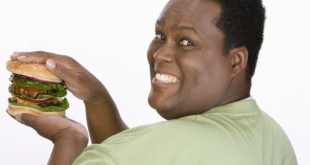Read the article and take the health quiz below.
When we think of being healthy, we automatically think of exercising, eating breakfast and eating fruits and veggies. These things help us to stay healthy but we often forget that 50 – 75 percent of our body weight is water. Since our body does not store water, we need a steady supply to meet our demand.
Our body uses water for many functions such as keeping our eyes moist, removing waste materials and even keeping the inside of our ears moist. Our body’s tissue, joints and muscles contain water. Our blood is 83 percent water and body fat contains about 25 percent water. Even our bones contain about 22 percent water weight. Water also helps regulate body temperature.1
Because of our high demand for water in the body it is important to keep hydrated. We can live without food for several weeks but we can live only for several days without water. A 2 percent drop of body fluids triggers thirst. A 4 percent drop, our muscles lose strength. If water weight drops 10 to 12 percent, we cannot tolerate heat well and we feel very weak. A 20 percent drop and we could lapse into a coma or even die.2
How do we lose water? We lose water in several ways. When we are physically active, have a fever, or moving around in hot weather, we sometimes lose water by sweating to help keep us cool. Our body keeps a tight control over temperature because we cannot survive when body temperatures drastically increase. When our body gets rid of waste material through urine and feces, we lose water. We also add to the loss through breathing or becoming ill; i.e. diarrhea.
What are the best sources of water to help us stay hydrated? There is nothing better than pure water to quench our thirst and replenish lost fluids. Oftentimes, we prefer to drink other fluids because we want flavor.
Milk, milk beverages and juices are often used to replace fluids. These drinks do offer the fluids we need and nutrients such as calcium or vitamin C to help us stay healthy. But they also offer calories and excess calories can lead to increased body fat. Getting the recommended amount of these beverages adds to our fluid intake but water should be the main source to replenish body fluids.
Coffee, sodas and teas are often used in place of water but they are not the best choices. These beverages can come with caffeine, which acts as a diuretic and a stimulant. They may also contain sugar, which can give us too many calories without nutrients. Alcohol is not a good choice for fluids either. These drinks can supply us with a steady stream of calories and they add up quickly.
Are there other benefits of drinking water? Water has not fat, cholesterol, calories or caffeine. It is low in sodium too. Water offers none of these substances and a chilled glass of water will help meet our needs.
Drinking water is a good way to get fluids into our body but foods can also increase our fluid intake. For example, celery, lettuce, tomatoes and watermelon contain more than 90 percent water. Even foods such as beans, rice, and potatoes contain more than 50 percent of their weight as water.3
How much do we need? We do know that adults lose about 1 to 1 ½ milliliters of water per calorie used. This translates into 1 to 1 ½ liters for every 1,000 calories used. If we take in about 2,000 calories a day, that means we need to replace at least 8 or 9 cups a day. If we exercise or play sports, increase intake to help stay hydrated.
Sometimes incorporating water into our diets can be difficult. By developing a plan to incorporate it into daily activities, can help insure that we get what we need and stay healthy. Here are a few ideas:
- Try taking breaks at work and fill an 8 oz. glass to sip while working.
- Add soup to a meal to increase the fluids
- Each time you walk pass a water fountain, plan to get sips of water. Drink sparkling water or plain water with a twist of lime at social gatherings instead of alcohol.
- If you are engaged in physical activity, plan to drink 4 to 8 ounces of water every 15 minutes. By the time we are thirsty dehydration may have already made you feel tired.
- When traveling, carry water with you.
- Try starting your day with an 8 ounce glass of water and ending it an hour or two before you go to sleep with a glass of water. This will give you about 25% of the water you need for a day.
Test Your Knowledge
Take the Quiz: Getting Enough Fluids
This short quiz tests your knowledge on the material you have read regarding Clearing the Facts about Water. If you have not read it yet, we suggest that you do so before taking the quiz.
End Notes
1. Duyff RL. The American Dietetic Association’s Complete Food & Nutrition Guide. Chronimed Publishing, Minneapolis, MN, 1996. pp. 167 – 184.
2. Wardlaw GM & Insel PM. Perspectives in Nutrition. Mosby – Yearbook. 1993, pp. 427.
3. Mayo Clinic Staff. Water: How much should you drink every day? April, 2010.
 Answers for Me Support & encouragement for every-day life
Answers for Me Support & encouragement for every-day life





This is awesome, the quiz helped me to a lot, thanks for the information.